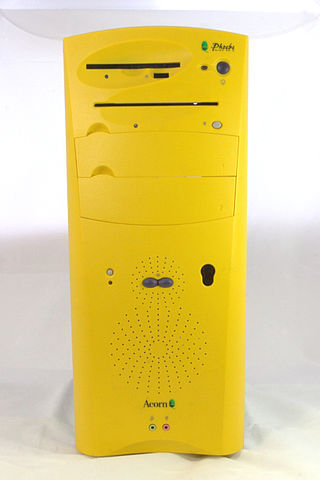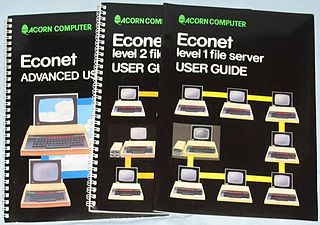Related Research Articles
Network File System (NFS) is a distributed file system protocol originally developed by Sun Microsystems (Sun) in 1984, allowing a user on a client computer to access files over a computer network much like local storage is accessed. NFS, like many other protocols, builds on the Open Network Computing Remote Procedure Call system. NFS is an open IETF standard defined in a Request for Comments (RFC), allowing anyone to implement the protocol.

Acorn Computers Ltd. was a British computer company established in Cambridge, England, in 1978. The company produced a number of computers which were especially popular in the UK, including the Acorn Electron and the Acorn Archimedes. Acorn's BBC Micro computer dominated the UK educational computer market during the 1980s.

Risc PC was a range of personal computers launched in 1994 by Acorn and replaced the preceding Archimedes series. The machines had a unique architecture unrelated to IBM PC clones and were notable for using the Acorn developed ARM CPU which is now widely used in mobile devices.

RISC OS is a computer operating system originally designed by Acorn Computers Ltd in Cambridge, England. First released in 1987, it was designed to run on the ARM chipset, which Acorn had designed concurrently for use in its new line of Archimedes personal computers. RISC OS takes its name from the reduced instruction set computer (RISC) architecture it supports.

The Iyonix PC was an Acorn-clone personal computer sold by Castle Technology and Iyonix Ltd between 2002 and 2008. According to news site Slashdot, it was the first personal computer to use Intel's XScale processor. It ran RISC OS 5.

The Phoebe 2100 was to be Acorn Computers' successor to the RiscPC, slated for release in late 1998. However, in September 1998, Acorn cancelled the project as part of a restructuring of the company.
The Network Computer was a diskless desktop computer device made by Oracle Corporation from about 1996 to 2000. The devices were designed and manufactured by an alliance, which included Sun Microsystems, IBM, and others. The devices were designed with minimum specifications, based on the Network Computer Reference Profile. The brand was also employed as a marketing term to try to popularize this design of computer within enterprise and among consumers.

RISC iX is a discontinued Unix operating system designed to run on a series of workstations based on the Acorn Archimedes microcomputer. Heavily based on 4.3BSD, it was initially completed in 1988, a year after Arthur but before RISC OS. It was introduced in the ARM2-based R140 workstation in 1989, followed up by the ARM3-based R200-series workstations in 1990.

Econet was Acorn Computers's low-cost local area network system, intended for use by schools and small businesses. It was widely used in those areas, and was supported by a large number of different computer and server systems produced both by Acorn and by other companies.
The Acorn Online Media Set Top Box was produced by the Online Media division of Acorn Computers Ltd for the Cambridge Cable and Online Media Video on Demand trial and launched early 1996. Part of this trial involved a home-shopping system in partnership with Parcelforce.

The Acorn Network Computer was a network computer designed and manufactured by Acorn Computers Ltd. It was the implementation of the Network Computer Reference Profile that Oracle Corporation commissioned Acorn to specify for network computers. Sophie Wilson of Acorn led the effort. It was launched in August 1996.

The A9home was a niche small-form-factor desktop computer running RISC OS Adjust32. It was officially unveiled at the 2005 Wakefield Show, and is the second commercial ARM-based RISC OS computer to run a 32-bit version of RISC OS. When the Iyonix PC was withdrawn from sale, the A9home remained the only hardware to be manufactured specifically for the RISC OS marketplace.
Network Computer Reference Profile was a specification for a network computer put forward by Oracle Corporation, endorsed by Sun Microsystems, IBM, Apple Computer, and Netscape, and finalized in 1996.
In computing, the icon bar is the name of the dock in Acorn's RISC OS operating system, and is fundamental to the OS. Its introduction in 1987 was a new concept in GUIs. It displays icons through which access is provided to all parts of the computer that a typical user will require, from physical devices and system utilities to running applications, and will usually be their starting point for interacting with the system once it has finished booting.
The Advanced Disc Filing System (ADFS) is a computing file system unique to the Acorn computer range and RISC OS-based successors. Initially based on the rare Acorn Winchester Filing System, it was renamed to the Advanced Disc Filing System when support for floppy discs was added and on later 32-bit systems a variant of a PC-style floppy controller.
RISCOS Ltd. was a limited company engaged in computer software and IT consulting. It licensed the rights to continue the development of RISC OS 4 and to distribute it for desktop machines from Element 14 and subsequently Pace Micro Technology. Company founders include developers who formerly worked within Acorn's dealership network. It was established as a nonprofit company. On or before 4 March 2013 3QD Developments acquired RISCOS Ltd's flavour of RISC OS. RISCOS Ltd was dissolved on 14 May 2013.

Acorn C/C++ is a set of C/C++ programming tools for use under the RISC OS operating system. The tools use the Norcroft compiler suite and were authored by Codemist and Acorn Computers. The tools provide some facilities offered by a fully integrated development environment.
RISC OS, the computer operating system developed by Acorn Computers for their ARM-based Acorn Archimedes range, was originally released in 1987 as Arthur 0.20, and soon followed by Arthur 0.30, and Arthur 1.20. The next version, Arthur 2, became RISC OS 2 and was completed and made available in April 1989. RISC OS 3 was released with the very earliest version of the A5000 in 1991 and contained a series of new features. By 1996 RISC OS had been shipped on over 500,000 systems.
Galileo was an unreleased 32-bit operating system that was under development by Acorn Computers as a long-term project to produce "an ultra-modern scalable, portable, multi-tasking, multi-threading, object-oriented, microkernel operating system", reportedly significant enough to Acorn's strategy to warrant a statement to the financial markets.
The DeskLite was a thin client launched in 1998 by Acorn Computers. It was designed to provide access to Microsoft Windows applications via Citrix ICA. It has been described as probably being the last product made by Acorn.
References
- ↑ Aguilar, Rose (1996-02-26). "Oracle to debut $500 network computer". CNET. CNET.com . Retrieved 2011-05-27.
The Oracle Network Computer (NC) [...] will come with a small footprint operating system called the NCOS [...]
- ↑ "Acorn Group spurs NC clone market by giving away nc hardware production and reference designs". PR Newswire. 1997-08-19. Retrieved 2011-06-07.
A scaled down version of RISC OS was licensed to Oracle to form its NCOS(TM).
- ↑ Mills, Elinor (1996-01-15). "Oracle unveils plan for family of Internet devices". Network World . p. 10. ISSN 0887-7661 . Retrieved 2011-06-10.
[Andrew] Laursen confirmed an agreement with Acorn Computer Group Plc. [...] on the development of reference designs for a range of network computer products. [...] "The Network Computer will use pieces of the RISC operating system [...] calling it NC-OS," [...]
- ↑ Pace Micro Technology PLC Annual Report & Accounts 2000 (PDF) (Report). 2000. Archived from the original (PDF) on 2008-12-06. Retrieved 15 April 2021.
- ↑ "Acorn Group PLC - Preliminary Announcement of Audited Results for the Year Ended 31 December 1998" (PDF). marutan.net. Archived from the original (PDF) on 18 July 2011. Retrieved 14 January 2011.
- ↑ Cullen, Drew (24 April 1999). "ARM denies role in Acorn dismemberment". The Register. Retrieved 31 January 2021.
- ↑ Middleton, Paul (2002-02-08). "Foundation Newsletter 20". RISCOS Ltd . Retrieved 2011-06-08.
Embedded RISC OS [...] In principle it will be similar to the NCOS derivative of RISC OS previously used in Network Computers [...]
- ↑ Whytehead, Chris. "Acorn NCs, STBs & Prototypes" . Retrieved 2021-04-15.
Acorn produced the following Network Computers, Set Top Boxes and Prototypes [...]
- ↑ "V.E.R.A. Search Results". VERA. Virtual Entity of Relevant Acronyms. Retrieved 2011-06-09.
NCOS Network Computer Operating System (OS, Oracle, Internet)
- ↑ Whytehead, Chris. "Bush Internet Surf Set" . Retrieved 2021-04-15.
- ↑ Whytehead, Chris. "Pace DSL4000" . Retrieved 2021-04-15.
- 1 2 "Acorn Network Computer: All This and RISC OS too!" (PDF). Acorn Clan Newsletter A7000+. Acorn Computers. 1997. pp. 13–15. Retrieved 2021-04-15.
- ↑ Nagel, Jim (August 1996). "Acorn Shopper". Computer Shopper. p. 633.